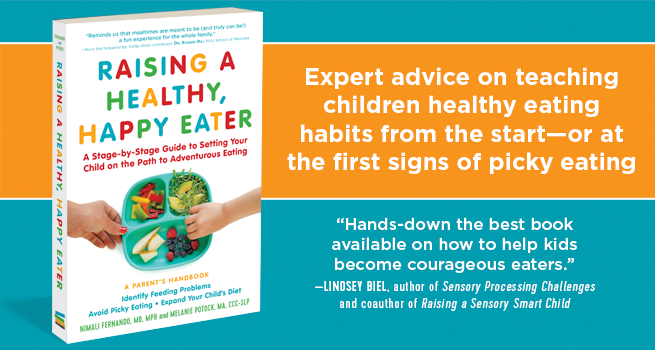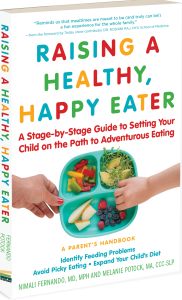When Do You Worry about a Picky Eater? I’ll answer that excellent question, posed by Dr. Klass in the October 10th issue of the New York Times. As a speech language pathologist and feeding specialist, my daily work is helping kids of all ages become more adventurous eaters. Children on the spectrum of “picky eating” include the example of the 9-year-old boy who lives on French fries, chicken fingers, white rice and white bread, as noted in the first paragraph of the article. Other examples on my caseload are the babies who have trouble transitioning to solids, and even kids who only eat vegetables – no meat, not carbohydrates, just “healthy” veggies. As noted in Dr. Klass’ article, they may have autism or a syndrome that leads to failure to thrive, but in my professional experience that’s often not the case. In fact, 1 out of 4 typically developing children will develop a feeding disorder (Eicher, 1997). A feeding disorder is defined as the inability to eat to eat a sufficient variety of foods in order to maintain a healthy nutritional status. (Arvedson, 1993).
So, when do you worry about a picky eater? When you begin to get concerned, discuss it right away with your pediatrician. If your child presents with any of the signs noted below, insist that your pediatrician refer your child for a feeding evaluation from a certified speech language pathologist or occupational therapist who specializes in the developmental process of feeding. Some of the red flags that signal that your child is having trouble moving through that developmental process include:
Infants:
• Feeding your baby is not an enjoyable experience. It’s difficult and stressful.
• Baby is not gaining weight.
• Baby is having trouble transition to purees or other solid foods.
• Baby gags and/or vomits on a daily basis.
• Baby has not begun to drink from an open cup or straw cup by one year. Know the developmental stages of learning to eat, and check in with your pediatrician to ensure that your child is meeting those milestones.
• Feeding your toddler is frustrating because he won’t sit in his high chair, he throws food and is irritable or uninterested in eating most of the time.
• Your toddler’s growth seems to be stalling.
• Your toddler eats well at daycare, but not at home.
• Your toddler refuses to eat anything but his favorites and “food jags” on those foods for weeks at a time.
Older Kids:
• Your child is not able to take a taste of new foods without significant stress.
• Your child has food allergies that causes him to severely limit his repertoire of even the safe foods.
• Your child won’t eat in the school cafeteria, even if he brings his own lunch.
The common denominator in all of these scenarios is the stress that having a hesitant, selective or picky eater brings to the child, the parents and the entire family. Just that level of stress in a household warrants getting help. Please don’t wait for your child to grow out of it, because very often kids don’t.
For more advice, check out Raising a Healthy, Happy Eater.

Melanie Potock, MA, CCC-SLP, is an international speaker on the topic of picky eating and feeding disorders in children, and the co-author of Raising a Healthy, Happy Eater. Her advice, found on her website MyMunchBug.com, has been shared in national publications including Parents magazine. In her over fifteen years of experience as a feeding therapist, her work visiting homes and schools to support families and children at mealtimes has been one of the most rewarding aspects of her career.
Nimali Fernando, MD, MPH, is a Virginia pediatrician and founder of the nonprofit the Doctor Yum Project, the popular recipe and parenting website doctoryum.com. The first of its kind, her innovative new practice, Yum Pediatrics, features a teaching kitchen and instructional garden, along with hands-on learning curricula for families, making it a hot-spot for nutrition education and cooking instructions. She is also a Fellow of the American Academy of Pediatrics.



